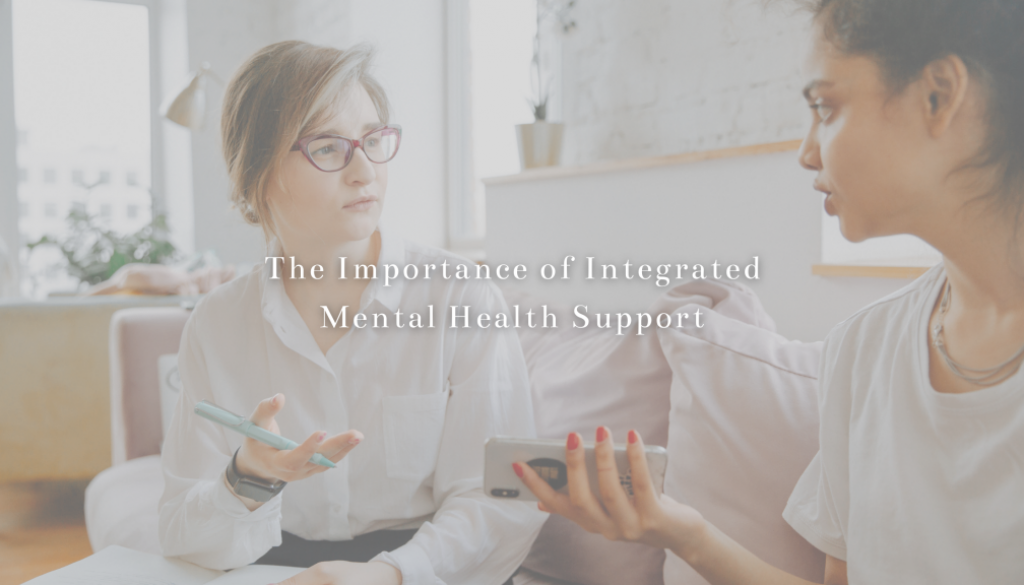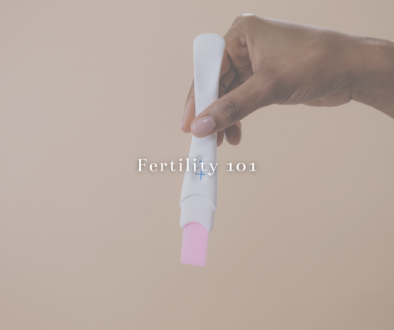Table of Contents
- What is integrated mental health support?
- What is the connection between women’s health and mental health?
- How do I find mental health help?
- How much does therapy cost?
If you are in immediate distress or are thinking about hurting yourself, call The National Suicide Prevention Lifeline toll-free at 1-800-273-TALK (8255) to speak with a certified crisis center near you. You can also text HOME to 741741 to connect with a Crisis Counselor.
Each month, organizations and people around the United States recognize a cause or illness to raise awareness. This month, May, brings Mental Health Awareness Month. The pro to these awareness months is obvious: we raise awareness and funds for further research or cures. But, what happens after the awareness month is over?
The people struggling with that illness do not simply go away, they still experience the same symptoms and adverse side effects day in and day out. Mental health in particular is the oftentimes invisible disease that causes us to suffer alone. Integrated mental health support was created with this in mind.
What is integrated mental health support?
Integrated mental health support extends beyond simply evaluating your psychological and emotional wellbeing. It evaluates multiple other factors such as the connection between mind and body, your lifestyle habits and behaviors, and any external forces like environmental and situational. With integrated mental healthcare, you consider the whole person.
What’s the connection between women’s health and mental health?
Let’s start with the fact that multiple studies have shown that, after puberty, women are 2x more likely to be diagnosed with depression and anxiety than men and take antidepressants at 2x the rate of men. Because girls typically reach puberty before boys do, they are also more likely to develop depression at an earlier age than boys. Some women may also experience premenstrual dysphoric disorder (PMDD). You can develop PMDD at any stage in life after your first period, with the highest diagnosis frequency happening in your mid-to-late 30s. It causes more severe symptoms than premenstrual syndrome (PMS), including severe depression.
Fertility and Mental Health
The path to conceiving a child looks different for everyone. For some, it’s a clear road from family planning to conception. For others, having a child is a winding highway filled with roundabouts and treacherous overpasses. In either case, you and your partner will experience a wide array of emotions: happiness, sorrow, excitement, mourning, or frustration. Both experiences are valid on their own merit but also are very different.
It is extremely stressful for those who experience trouble with conceiving a child. Participating in fertility testing and assessments while not knowing what the problem is can feel hopeless. With fertility struggles, you lose control over the situation. This can be extremely scary.
Actively working with a mental health professional throughout the fertility process can offload the stress. Talking about the stresses and emotions prevents you from bottling it up inside.
How do I find mental health help?
There are many ways to take control of your mental health and find a therapist who will be the best fit for you. Here are some ideas on how to find someone near you or online:
- Ask your primary care provider for a referral. Depending on the size of the practice, they may offer therapy.
- Work with a Personal Care Coordinator. Certain hospital networks will offer a screening service where you speak with a nurse to assess the providers. At Her Serenity, we offer Personal Care Coordinators who will work with you to understand your unique situation. Her Serenity offers solutions for talk therapy, life coaching, group classes, and community support.
- Search online. Due to the COVID-19 pandemic, online therapy offerings have increased. Services like Talkspace or Doctor on Demand offer talk therapy (it’s important to note that these services are typically not integrated mental health solutions).
How much does therapy cost?
If you have insurance, the first step to understanding the cost for therapy is setting up a call with your care coordinator, or calling your insurance provider or visiting their online portal. Choosing an in-network provider will help lower the cost of therapy. The last thing you want to do is cause more stress by having a large bill at the end of your session.
Her Serenity is here for you
Navigating finding a mental health provider while experiencing anxiety, depression, or recent trauma is overwhelming. Partnered with the leading experts in mental healthcare, Her Serenity fights for your peace of mind every step of the way. Our mental health specialists integrate to form a complete mental health clinic.
What is Her Serenity?
The medical community today is very fragmented: you see a general practitioner for an annual physical, a gynecologist for sexual health, a reproductive endocrinologist for fertility… but who brings it all together and decodes it for you? Her Serenity combines a carefully curated network of medical professionals, a Personal Care Coordinator (completely dedicated to you and your journey, every step of the way), and a community of women. We are driven with love to help manage your wellness, fertility, and family planning.

